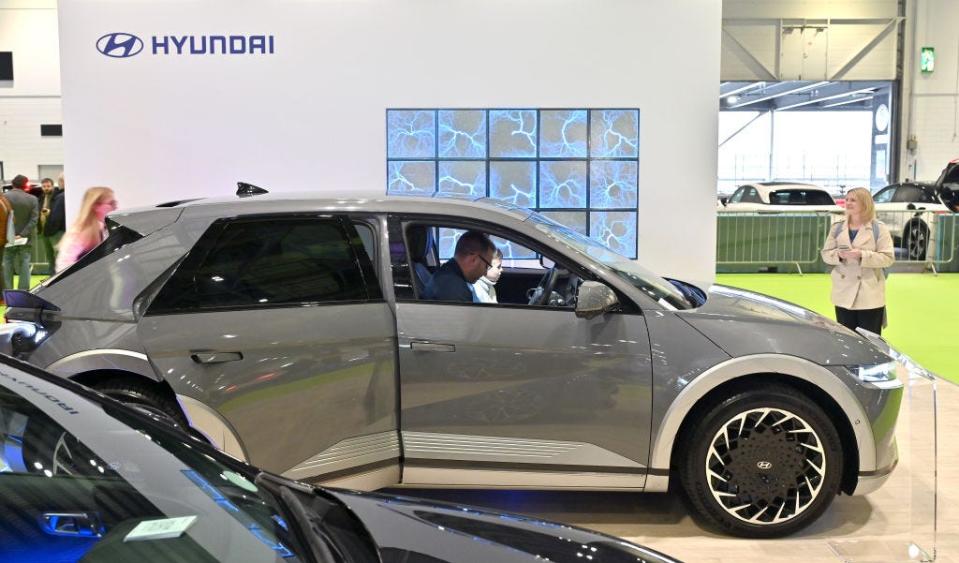Waymo Teams Up with This Automaker for EV Robotaxis

Waymo reveals partnership with Hyundai on next generation of SAE Level 4 robotaxis, with the modified Ioniq 5 slated to take over for the Jaguar I-Pace in the coming years.
The robotaxi operator has largely relied on the Jaguar I-Pace during its debuts in the Bay Area and has been looking for another electric replacement, including from Geely's Zeekr brand now largely seen as blocked by tariffs.
Waymo has been working on launching its robotaxi services in a number of other cities outside the West Coast, including Tesla's new hometown of Austin, Texas, and Atlanta, Georgia.
Robotaxi developer Waymo has revealed a strategic partnership with Hyundai that will see the Ioniq 5 join its robotaxi fleet in due time. The two companies plan to integrate Waymo's SAE Level 4 tech, dubbed Waymo Driver, into the electric hatch, which will be produced in "significant volume" over a period of several years.
The electric hatchbacks will be destined for the Waymo One fleet, eventually replacing older Jaguar I-Pace models.
The Ioniq 5 models will be modified to house the autonomous sensors and computer hardware but will also feature new convenience features like power doors, so the modifications won't be just a matter of fitting a sensor pod on the roof.
Waymo also credits the model's 800-volt architecture, which will permit faster charging and therefore shorter downtimes as part of a robotaxi fleet.
But the Ioniq 5 won't join Waymo's fleet for a while.
Waymo plans to begin on-road testing of the modified hatchbacks in late 2025, and they will join the Waymo One fleets in later years.
"We recently announced the launch of Hyundai Motor Company's autonomous vehicle foundry business to provide global autonomous driving companies with vehicles capable of implementing SAE Level 4 or higher autonomous driving technology," said Chang Song, President and Head of Hyundai Motor Group's Advanced Vehicle Platform (AVP) Division.
The Jaguar I-Pace, meanwhile, which has served as the backbone of Waymo's fleet, is not expected to receive a direct Jag replacement once it exits the stage in 2025.
Waymo and Hyundai's strategic partnership is being revealed at an interesting crossroads and is seemingly being steered in part by recent tariffs on Chinese EVs and components that kicked in late last month and that have already had an effect on the consumer EV market.
For the past couple of years Waymo had been working with Geely's Zeekr on a purpose-built electric robotaxi for export that could replace Waymo's converted mass-market models.
Following the announcement of 100% tariffs on EVs produced in China by the Biden administration, Zeekr's robotaxi is expected to become a much more difficult vehicle to import, even though it's not a consumer-aimed model.
But Waymo has not revealed any drastic shift in plans in regards to Zeekr's robotaxi, which has already been testing in North America.
The Ioniq 5, on the other hand, will be assembled much closer to home.
"The Ioniq 5 vehicles destined for the Waymo fleet will be assembled at the new Hyundai Motor Group Metaplant America (HMGMA) EV manufacturing facility in Georgia and then integrated with Waymo's autonomous technology," Waymo noted.
Waymo hasn't said how the tariffs could affect its partnership with Zeekr in foreign markets where Waymo could launch robotaxi services in the near future.
Waymo has emerged as the robotaxi tech leader in the US over the past year and is currently working on expanding its service to customers in Austin, Texas—Tesla's new hometown—and Atlanta, Georgia.
Will robotaxis achieve significant market share by 2030, or will they largely remain a curiosity in a number of cities? Let us know what you think in the comments below.

 Yahoo Autos
Yahoo Autos 